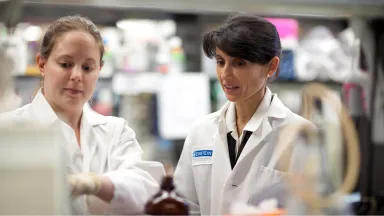
Yousin Suh, Ph.D.
- Adjunct Professor, Department of Genetics
- Adjunct Professor, Department of Medicine (Endocrinology)
Location
- Columbia University 630 West 168th Street 10-518 New York, NY 10032
Research Profiles
Professional Interests
Functional Genomics of Aging
Our long-term research goal is to investigate the genetic components of aging and aging-related disease using functional genomics approaches. We focus on the identification of gene sequence variation, i.e. single nucleotide polymorphisms (SNPs), in candidate genes and the assessment of their potential functional impact on aging-related phenotypes. Candidate genes include categories of genes implicated in the modulation of common causes of aging, e.g. free radical production, antioxidant defense, genome maintenance, and apoptosis, or more targeted pathways involved in specific aging-related diseases such as breast cancer. Any genetic variation found to be significantly associated with one or more defined aging phenotypes is then further investigated in specific functional tests, utilizing in silico modeling, in vitro cell culture models, and mouse models. We consider the assessment of the functional impact of SNP haplotypes, i.e., allelic variation caused by multiple SNPs in the same gene, in vitro and animal models as essential to confirm the link between genotype and phenotype in aging studies. This should ultimately result in an integrated approach to study the genetics of aging at different levels ranging from genetic determinants in the form of DNA sequence variations, through cell type- and tissue-specific gene expression profiles, to molecular and cellular endpoints in tissues, to impacts on quality and duration of life span. The results are expected to lead to the identification of functional pathways that control basic aging processes and the onset of age-related diseases. Insight into the functional impact of individual genetic variation on the aging process will lead to a better understanding of phenotypic variation in aging human populations, including susceptibility to aging-related diseases and exceptional longevity. Importantly, it will help close the long-held gap between the population genetics and molecular genetics of aging.
Four systematic multidisciplinary studies are currently underway. First, we have initiated a population-based association study to test genotype-phenotype correlations of genome maintenance genes in a breast cancer cohort. We focused on the tumor suppressor BRCA1, which is involved in double strand break repair with broad effects on cellular physiology and genomic stability. Using a comprehensive screening method, we determined BRCA1 haplotypes and their frequencies in a total of 1312 female breast cancer patients with different ethnic and/or geographical origins. Comparing patterns of BRCA1 haplotypes between cases and controls, we demonstrated the enrichment of rare haplotypes in breast cancer patients compared to healthy controls. We are currently testing our hypothesis that these rare combinations of common SNPs give rise to BRCA1 gene variants with suboptimal function of the encoded gene products, which may lead to susceptibility to breast cancer. Second, using a longitudinal study of aging cohort of 619 Mexican Americans and 459 European Americans, we are testing the hypothesis that genetic variation at loci involved in genome maintenance mechanisms (e.g., DNA repair, antioxidant defense, cell cycle control, and apoptosis) can be related to individual differences in the rate and severity of aging-related phenotypes. Functional assays of allelic gene variants positively associated with phenotypes will provide insight into the biological significance of genome maintenance in aging. Third, we are focusing on identification of functional SNP haplotypes of genes involved in the Growth Hormone/Insulin-like Growth Factor-1 (GH/IGF-1) pathway. Down-regulation of the GH/IGF-1 pathway is well-known to extend life span in model organisms varying from worms and flies to mice. We are investigating whether this evolutionarily conserved pathway play a role in human longevity using Ashkenazi Jewish centenarian cohorts. Our results from genetic and biochemical analysis indicate that partial loss-of-function mutations in genes acting in the GH/IGF pathway are overrepresented in centenarians relative to controls, which is the strongest evidence to date for a role of this pathway in modulation of human lifespan. Fourth, we are studying mouse models that harbor human gene variations in DNA repair/genome maintenance and as a consequence manifest premature aging phenotypes. Our results from transcriptome analysis delineate a complex genetic network of cellular responses to endogenous DNA damage and suggest it as the cause of the premature aging phenotypes in these mice.
Selected Publications
Suh, Y., Atzmon, G., Cho, M.-O., Hwang, D., Liu, B., Barzilai, N., Cohen, P. Functional insulin-like growth factor-I receptor mutations in centenarians. Proc. Natl. Acad. Sci. 105: 3438-3442. 2008.
G. Atzmon, M. Cho, R.M. Cawthon, T.. Budagov, M. Katz, X. Yang, G. Siegel, A. Bergman, D.M. Huffman, C.B. Schechter,W.E. Wright, J.W. Shay, N. Barzilai, D.R. Govindaraju, and Y. Suh. Genetic variation in human telomerase is associated with telomere length in Ashkenazi centenarians. Proc.Natl. Acad. Sci. 107 Suppl(1):1710-1717. 2010
Tazearslan, C., Huang, J., Barzilai, N., and Suh,Y. Impaired IGF1R signaling in cells expressing longevity associated human IGF1R alleles. Aging Cell. 10(3):551-4. 201
Suh, Y. and Kennedy, B.K. Dialing down SUN1 for laminopathies. Cell. 149(3):509-10. 2012
Park, C., Suh, Y*., and Cuervo*, A.C. Regulated degradation of Chk1 by chaperone-mediated autophagy in response to DNA damage. Nature Communications. 6:6823. 2015.
Johnson, S.C., Dong, X., Vijg, J., Suh, Y. Genetic evidence for common pathways in human age-related diseases. Aging Cell. 4(5):809-17. 2015
Lau CH, Suh Y. In vivo epigenome editing and transcriptional modulation using CRISPR technology. Transgenic Research. PMID: 30284145. 2018
Ryu, S., Han, J., Norden-Krichmar, T., Zhang, Q., Lee, S., Zhang, Z., Atzmon, G., Niedernhofer, L.J., Robbins, P.D., Barzilai, N., Schork, N.J., Suh, Y. Genetic signature of human longevity in PKC and NF-κB signaling. Aging Cell e13362. 2021
Jin, C, Wang, X., Hudgins, AD, Gamliel, A, Pei, M, Kim, S, Contreras, D, Hoeijmakers, J, Campisi, J, Lobo, RA, Williams, SZ, Rosenfeld, MG, Suh, Y. The regulatory landscapes of human ovarian ageing. 2022. https://www.biorxiv.org/content/10.1101/2022.05.18.492547v1 (Preprint)






